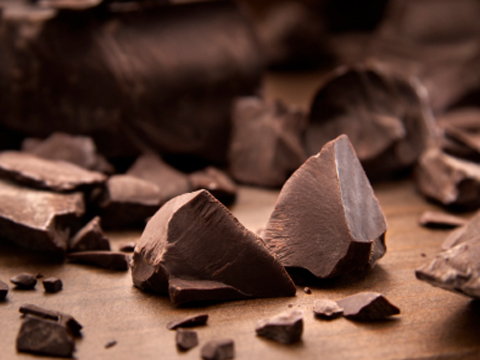Contributed by reader, Jenni Peers
The Surprising Health Benefits of Chocolate
Unless you were born in the last decade, chances are, you have been told time and time again that chocolate is “fattening”. Thankfully, science has stepped in to debunk yet another myth and over the past decade, many studies have been undertaken into the substantial health benefits of chocolate. Chocolate is made from cocoa butter, obtained from the cocoa bean (also known as cacao). Cacao is an excellent source of oleic acid, a monounsaturated fat which has been found to reduce blood pressure, aid in weight loss, prevent ulcerative colitis and aid in the production of myelin, a protective covering that protects brain neurons and muscles. If that all wasn’t exciting enough, an important study published in the Journal of Lipid Research has found that oleic acid inhibits fatty acids and the production of cholesterol in specific cells. These are just some of the many ways that dark chocolate can add many pleasurable years to your life:
- Chocolate contains a wealth of antioxidants – If you thought green tea was the most potent source of antioxidants, think again! Raw chocolate has three times more antioxidants!
- Chocolate is rich in magnesium: Magnesium is a supplement which is often recommended to raise energy levels, though many people are unaware that it is present in abundance in raw chocolate.
- Chocolate beautifies the skin and hair: The sulfur in chocolate promotes beautiful, glowing skin and also does wonders for hair and nail strength, since it is a natural detoxifying food.
- Chocolate can promote positive personality traits: A very interesting study tapped into the link between blood fats in the brain and personality traits in teenage boys with ADHD. Researchers found that subjects with higher levels of oleic acid possessed greater ‘plasticity’ (a trait associate with qualities like social ability, positivity, enthusiasm, imagination and even intelligence).
- Chocolate is a high-fiber food and can therefore form part of a weight loss diet: Who would have thought chocolate could actually help us lose unwanted fat? The high fiber content in raw chocolate in particular makes it easier for dieters to feel satisfied. The high oleic acid content of cacao, meanwhile also helps us lose weight, by increasing the rate of fat oxidation (i.e. fat burning). It also increases the body’s efficiency at utilizing fat as a source of energy.
It is important to bear in mind that when we speak of the health benefits of chocolate, we are speaking of dark (preferable raw) chocolate, rather than milk chocolate. Most commercially accessed chocolate is packed with milk solids and sugar, and contains very little ‘real chocolate’. Milk chocolate can also contain added oils which are rich in saturated fat, and which cause our levels of bad cholesterol to spike. Raw chocolate, sweetened with alternative natural sweeteners like Agave or stevia, is the ideal choice for those seeking maximum health benefits, since most commercial chocolate is heated to very high temperatures, thereby wresting many important benefits from the cacao bean.
It is likewise vital to be aware that chocolate isn’t necessarily beneficial for everyone. One of its components, arginine, is highly beneficial to most people. Arginine has been found to reduce the healing time required by injuries, to lower blood pressure and to accelerate the healing of damaged tissue. Yet it is also an amino acid that is required for the replication of particular infections (the virus which causes cold sores, for instance), so it is vital for those who are prone to these infections to balance their arginine intake with a sufficient amount of foods containing lysine (an amino acid which inhibits these infections). Lysine can be found in abundance in foods like fruits and vegetables, dairy products and fish. In general, health buffs should aim to follow the Mediterranean diet, which is centred on fresh, seasonal, unprocessed foods, and Omega-3 fatty acids (found in fatty fish and walnuts), which are an important part of maintaining cardiovascular health.
We hope our post has convinced you to reach for a bar of chocolate, or better yet, to get into the kitchen and make a bar or two yourself by following some of the many online recipes available on top food preparation sites. Start out with a simple basic chocolate recipe and let your mind flow, incorporating superfoods like Goji berries, nuts and even edible essential oils, to maximize the benefits of this incredibly delicious treat.
Sources used for this article and further informative reading:
P De Silva, Dietary arachidonic and oleic acid intake in ulcerative colitis etiology: a prospective cohort study using 7-day food diaries. European Journal of Gastroenterology & Hepatology. 2014; 26(1): 11-18.
MooScience, Oleic Acid Has Many Health Benefits, accessed July, 2014.
JH Lim, Oleic Acid Stimulates Complete Oxidation of Fatty Acids through Protein Kinase A-dependent Activation of SIRT1-PGC1α Complex. The Journal of Biological Chemistry. 2013; 288(10): 7117-26.
F Natali, Oleic acid is a potent inhibitor of fatty acid and cholesterol synthesis in C6 glioma cells. Journal of Lipid Research. 2007; 48(9): 1966-75.
Regan Naturophatic, The Truth About Arginine, Lysine and Herpes Simplex Virus, accessed July, 2014.
A Haug et al, Bovine milk in human nutrition – a review. Lipids in Health and Disease. 2007; 6:25.
Stdpanels, STD Risk Factors, accessed July, 2014.
Chocchic.com, Raw Chocolate Benefits, accessed July, 2014.
P Marckmann et al, Low-fat, high-fiber diet favorably affects several independent risk markers of ischemic heart disease: observations on blood lipids, coagulation, and fibrinolysis from a trial of middle-aged Danes. American Journal of Clinical Nutrition. 1994; 59: 935-39.




